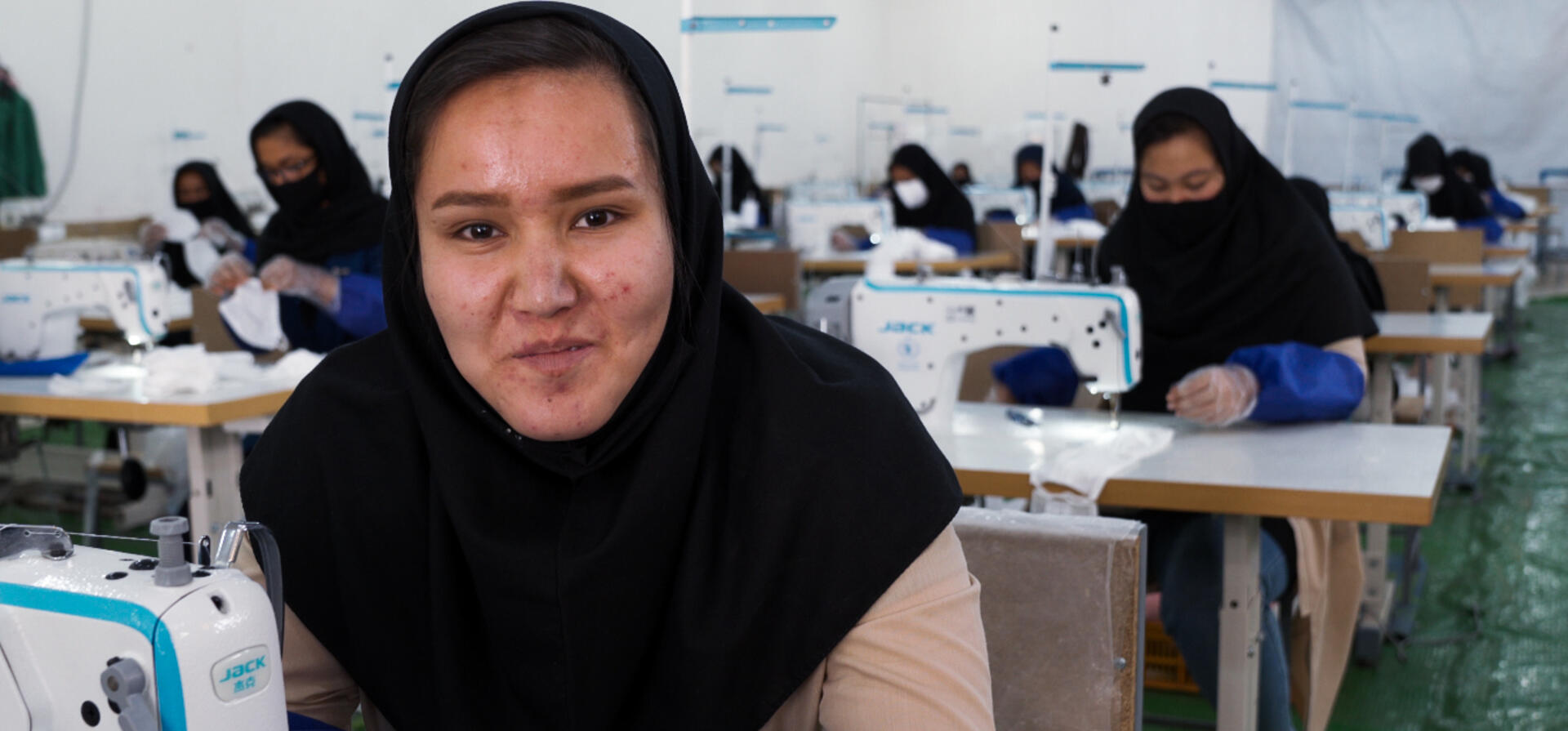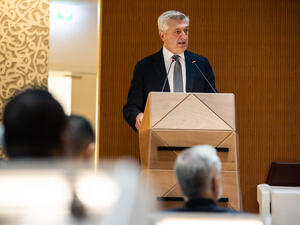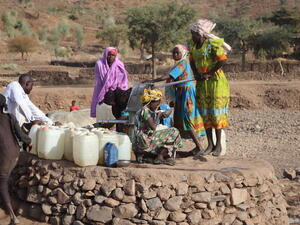Refugee tailors ramp up mask production, as COVID-19 lingers in Iran

Refugee tailors ramp up mask production, as COVID-19 lingers in Iran
Roya sets the white fabric under the needle and presses the pedal of her sewing machine, adding finishing touches on the face mask she is making. Around her, rows and rows of other refugees are also churning out masks – much sought-after protection made necessary by the unrelenting COVID-19 pandemic. The Islamic Republic of Iran continues to battle the novel coronavirus, with renewed health-related measures recently put in place to further curb the spread of the virus.
“I am proud that I am able to play an important role in the fight against COVID-19,” says Roya, 20, focusing on her stiches. “Every mask I make, I think maybe I or someone I know will wear it, so I make sure it is of the best quality possible.”
Roya works in a tailoring workshop in Sarvestan refugee settlement, in Iran’s southern Fars province, along with around 50 other refugee women. The workshop was established by UNHCR, the UN Refugee Agency, and later expanded by the World Food Programme (WFP). It switched its production line at the start of the pandemic to make hygiene masks, in an example of refugees’ direct involvement in the fight against COVID-19, but also of their effort to safeguard their monthly income.
Since February 2020, when the first COVID-19 cases were officially recorded in Iran, Roya and her fellow refugee tailors have produced more than 10,000 masks per day, which are delivered to health and humanitarian service providers across the country.
Since the outbreak of the pandemic, UNHCR has airlifted over 100 tonnes of medical aid in support of Iran’s Ministry of Health and Medical Education and the Bureau for Aliens and Foreign Immigrants Affairs (BAFIA). WFP also flew in more than three million surgical and N95 masks to help frontline health workers in Iran stay safe.
But more support is still needed, despite the fact that the Government of Iran is doing its level best to strengthen medical facilities and services to fight against the virus.
“We have worked really hard, even during holidays, to make these masks,” says Roya. “I just hope that people will continue wearing masks and taking health precautions seriously, as otherwise our work is wasted.”
Like elsewhere in the world, many people in Iran have lost their jobs due to the devastating socio-economic impact of COVID-19. Refugees, who usually rely on precarious and informal jobs for their income, have been particularly hard hit. UNHCR estimates that the main breadwinner in approximately one-third of all refugee households in Iran has been left unemployed. Many refugees, who were already struggling to make ends meet, now find it more and more difficult to fend for themselves.
Roya was scared she would lose her only source of income. At just 20 years old, she is the main breadwinner of her family. “My father is old and ill and cannot work anymore. My mother also used to work at the tailoring workshop, but she developed severe neck and knee issues and now cannot work as much as before,” she explains. “I am relieved I was able to keep helping my family throughout the pandemic.”
Roya’s parents fled Ghazni, a city in central Afghanistan, some 30 years ago, after several members of their respective households were targeted and killed by the Taliban. Roya and her four siblings were all born in Iran. When she finished high school, Roya wanted to go to university to study fashion design, but the costs were too high.
“I have not given up on my dreams, but for now, my priority is making sure my family has enough to live on.” Today, the salary she makes helps support her parents and three younger siblings.
Iran hosts nearly a million refugees, mostly Afghans who have sought safety from a four-decades long conflict in Afghanistan. While the majority of refugees in Iran live in cities, towns and villages, some three per cent like Roya and her family live in refugee settlements.
In these refugee settlements, UNHCR and WFP, in coordination with BAFIA, have distributed hygiene items including soap and hand sanitizers, masks and gloves to refugees, so that as many as possible can keep safe amidst the COVID-19 pandemic.
“When the outbreak started, everyone was scared and worried,” remembers Amir Roshan, the manager of Sarvestan refugee settlement. “The tailoring workshop had no more orders for clothes… that was when the refugees saw an opportunity to help the community by making masks. At the same time, they can continue earning an income to support their families.”
Thanks to the generous support of donors like the European Union (Directorate-General for International Partnership) and the Republic of Korea, the tailoring workshop was equipped, and refugees were provided with training.
UNHCR and WFP continue to support the livelihoods of refugees to build their confidence and acquire marketable skills – making them better able to support their families in the host country and, when the conditions become conducive, in their home country.
Around the country, refugees like Roya are joining the fight against COVID-19 in different ways. While some are sewing more masks and protective equipment, others are working tirelessly as nurses to treat COVID-19-positive patients, while yet others are playing a key role in making sure Afghans and the host community have access to the latest information regarding health measures.
“I wish for a world without COVID-19,” says Roya, “but for as long as the pandemic is here, we will produce masks to help our community and the health workers, so that together we can fight COVID-19.”









